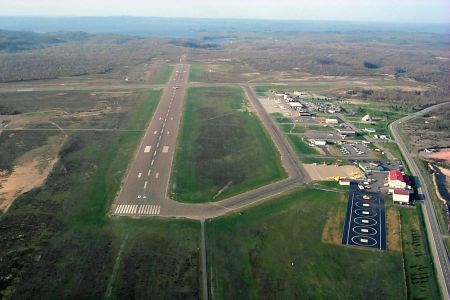As the economic fortunes of the City of Greater Sudbury continue on the upswing, demand for the serviced industrial lands is putting pressure on supply and causing some concern in business circles.
To help meet this rapidly growing demand, officials at the Greater Sudbury Airport are looking to create a new $2.3-million phase of expansion of serviced lands on airport grounds.
This would be the third such expansion in three years, after spending $700,000 in 2007 to allow for a few private hangars, then spending $1.2 million in 2008 to create an additional eight lots.
The success of these programs has found the airport backwhere it began, with all of its available lots either fully developed or under construction by eager businesses.
“We’re excited about developing this, because there’s nothing more frustrating than missing out on a lost opportunity,” says Bob Johnston, the airport’s CEO.
“The industry moves very quickly, and we’ve discovered that if you’re not ready when they come to you, they’re likely to pass you by. Waiting until you’re prepared, even if it’s just a few months away, isn’t really an option for them.”
Officials are still in talks with provincial and federal governments to seek funding for the project, though early discussions have yielded a “favorable response,” says Johnston.
As such, construction is likely to begin in the spring of next year. The move will open up to five hectares of new space, creating six large lots and three areas for general aviation hangar development. The hope is to attract new businesses seeking to expand and whose services or products are well served by having easy access to the skies.
As an example of the range of companies that are already making use of airport lands, including provincial policing and fire suppression efforts, Johnston points to a new $2.3-million hangar being built by Geotech Ltd. The 20,000-square-foot hangar for the Sudbury-based airborne geophysical survey company will create 30 new jobs.
These kinds of efforts are needed to help maintain the growth of business and industry in the area, says Johnston.
It’s a perspective shared by some in the local business community, where there is a simmering frustration with the general lack of available, serviced land in popular parts of the city.
“There’s been continual demand from our members, and there’s been a growing number of complaints about the lack of serviced land,” says Dick DeStefano, executive director of the Sudbury Area Mining Supply and Service Association. “Private developers can’t expand, which slows their growth and reduces their opportunities. Guys are getting pretty frustrated.”
While there are abundant vacant industrial lands, the majority of heavy industrial lands are ill-serviced, he says.
DeStefano has some hope in the city’s efforts to look into the problem, which are being spearheaded through the Greater Sudbury Development Corporation’s (GSDC) commissioning of a study to examine development costs, servicing needs, and the status of existing lands.
The study includes some of the members’ greatest points of frustration, such as the Fielding Road area, where there are currently 190 acres of vacant industrial land zoned for heavy industry. However, most of it is not serviced, and the road is inadequate, says DeStefano.
Similarly, several industrial park areas lack adequate fire flows. The increase in fire regulations means business owners must pay for related water storage, something that strikes a nerve for businesses already paying up to $110,000 a year in taxes.
Addressing the dearth of properly serviced land is also one of the top priorities of the Greater Sudbury Chamber of Commerce. Debbi Nicholson, president and CEO, acknowledges the matter has only reached the top of the chamber’s list in recent years, after the pre-recession mining boom ate up the bulk of local capacity.
The GSDC study is a positive step, she says, and will help form the basis of what will eventually be a solution to the problem.
Nicholson says that creating additional serviced land will likely be costly, and will likely require a public-private partnership. To that end, the chamber is looking to potentially join forces with the city and the GSDC to resolve the issue, she says. In the meantime, some private-sector efforts are underway to bring some serviced lands online using their own money.
Dario Zulich, president of TESC Contracting Company Ltd., received approval from the planning committee on Oct. 5 to build a 33-lot industrial park on the Kingsway, adjacent to the city’s landfill site.
“I already have interest from those who want to buy property at my site when it is ready,” says Dario Zulich, president of TESC Contracting Company. “I can meet that demand.”
Zulich says he anticipates a renewed boom for Sudbury over the next five years as the area’s major mining companies have settled their labour concerns and are set to spend big bucks in the region.
(with files from Northern Life newspaper)




